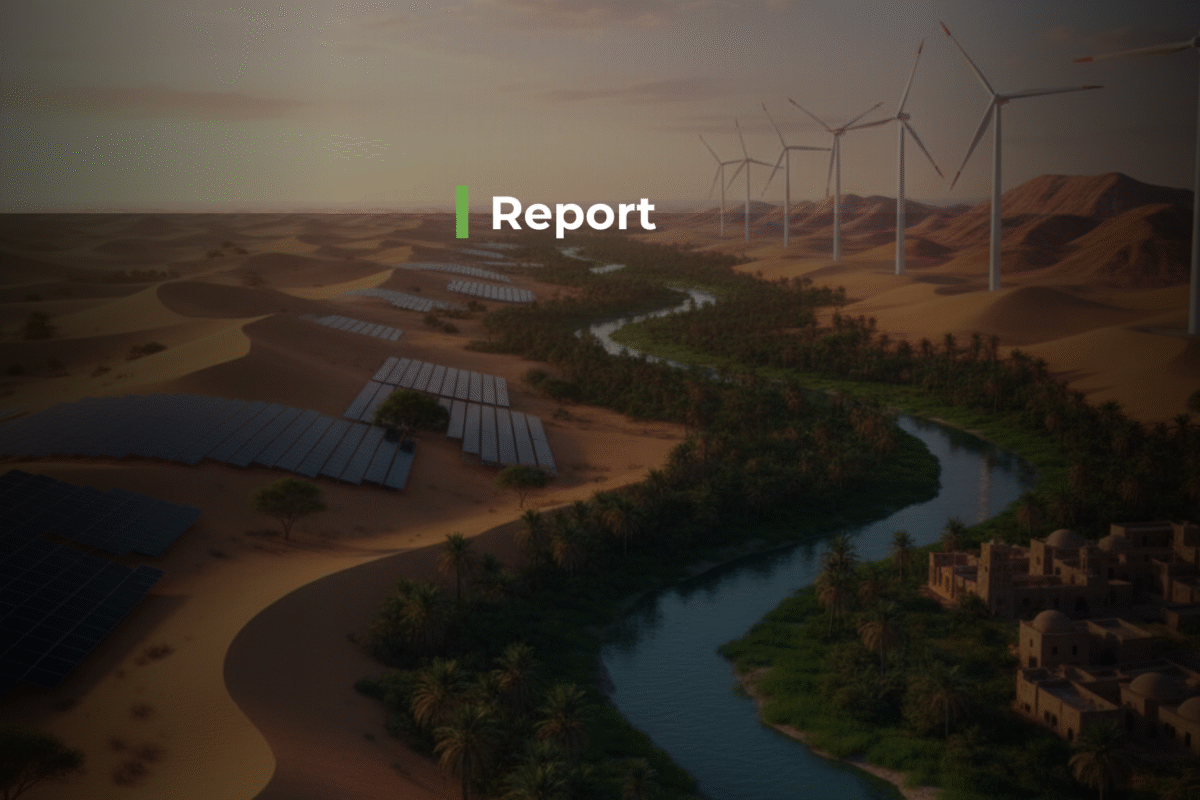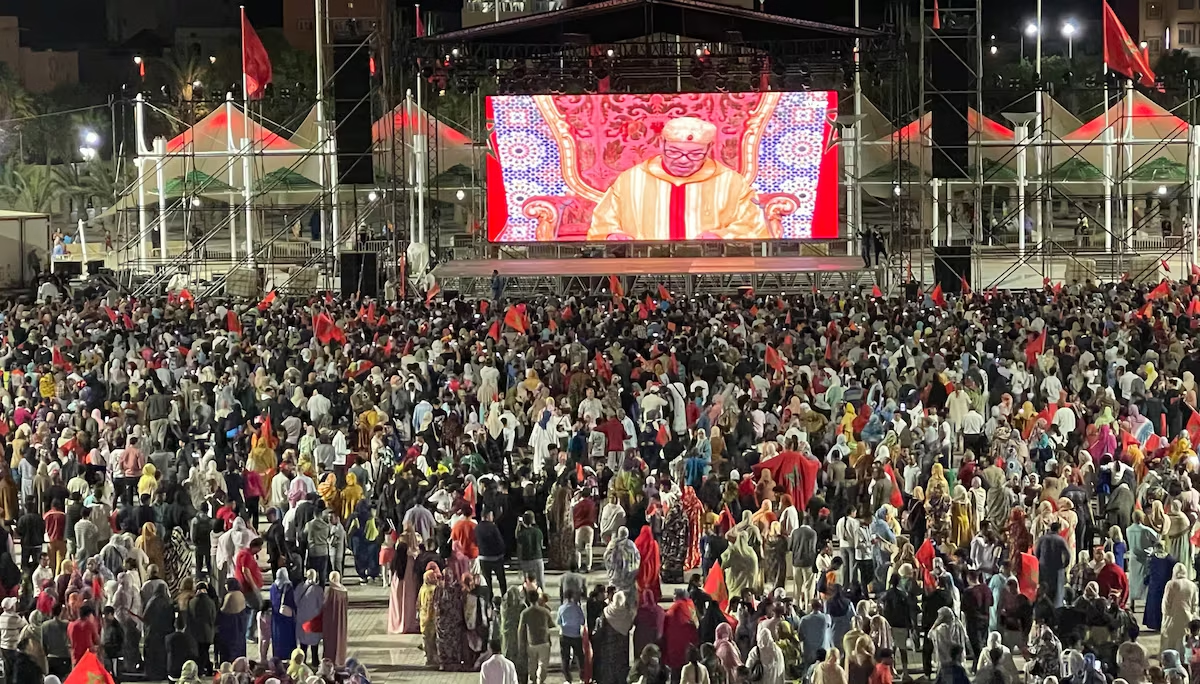Since the COVID-19 crisis, the Moroccan government has been covering the expenses of private press companies. Over four years, the subsidies have amounted to more than 1.5 billion dirhams, a practice that harms independence, pluralism, and freedom of expression in the country
Introduction
Employees of private press companies have received public financial support amounting to 1.5 billion dirhams,1 Sources and references include: – Presentation of the 2025 sub-budget for the Ministry of Youth, Culture, and Communication, p. 86. – Memorandum introducing the 2024 Finance Bill, pp. 81–82. – Report of the Education, Culture, and Communication Committee on the 2023 sub-budgets for the Ministry of Youth, Culture, and Communication (October 2022 session), p. 235. – Report of the Education, Culture, and Communication Committee on the 2022 sub-budgets for the Ministry of Youth, Culture, and Communication (October 2021 session), p. 142. – Response of Minister Mohamed El Mahdi Bensaid on 14 September 2022 to a written question from MP Youssef Chiri (National Rally of Independents group) on “the fate of national and regional print media and measures taken to support it.” – Response of Minister Mohamed El Mahdi Bensaid on 17 March 2022 to a written question from MP Naima El Fathawi (Justice and Development group) on “working conditions for female and male journalists during the COVID-19 pandemic.” – “Government Support for the Press and Publishing Sector in Morocco: Data and Statistics,” accessed 12 April 2025, Ali3lami, https://tinyurl.com/49p7mws4.including about 325 million dirhams at the end of the previous government’s term (2016-2021) and more than 1 billion dirhams under the current government (2021-2026). The available figures cover the period from mid-2020 to March 2025,2 Journalists from seven media enterprises (print and digital) report that, when asked whether the Ministry of Youth, Culture, and Communication had stopped paying professional journalists’ salaries after March, they continued to receive payment, extended for at least six months to one year. The Ministry’s 6 May 2025 announcement on its website launching the application period for public support to the press, publishing, printing, and distribution sectors (14 May to 26 June 2025) confirms continuation. See Ministry website: https://tinyurl.com/593fnzjp at which point the wage payment system was scheduled to end with the issuance of new legal requirements regarding public support for the press, publishing, printing, and distribution. Originally initiated in 2020 as an exception in response to the COVID-19 pandemic, the subsidy quickly turned, over the years, into a continual appropriation within the budget of the communication sector (the Ministry of Youth, Culture and Communication), in favor of the private sector.
The issue of public has resurfaced in public discourse following revelations, referred to as the National Social Security Fund leaks3 Obeid El Harras, “After the Breach… ‘Social Security’ Reassures Citizens and Takes Security Measures,” Sawt Al-Maghrib website, accessed 16 April 2025, https://tinyurl.com/4txpcwrr. These leaks indicated that subsidies were used to cover the salaries of certain managers within private press companies. This situation also draws attention to concerns regarding the concentration of interests, specifically the ownership of media conglomerates by a small number of influential business figures prominent in print journalism and influential online platforms. These individuals often possess direct or indirect ties to political authorities and, at times, have overlapping interests with state entities. Examples include the “Caractère” Group, a subsidiary of the Akwa Holding Group owned by businessman and Head of Government Aziz Akhannouch; the “Eco-Médias” Group; and the “Horizon Press Group,” led by businessman and former Minister of Youth and Sports Moncef Belkhayat4Abdelmajid Fadil, Economics of the Written Press, National Press Council Publications (n.p.: n.d.), pp. 12–13 (adapted)..
This situation prompts several questions: Why continue to pay the salaries of employees in companies ostensibly in the private sector, instead of reverting to the previous model of providing subsidies to cover some of the costs of these companies? How is this subsidy being utilized? Have the transparency and accountability rules enshrined in the constitution and the law been respected?
The public subsidy comes in the context of the refusal of press companies 5The “Victims of the Interim Committee for Managing the Press Sector” coordination refers in its 2024 statement to this withdrawal as “media enterprises abandoning payment of journalists’ salaries.” to pay the salaries of their employees and their social rights, under the pretext of the Covid crisis at times, and the sector crisis at other times6The National Human Rights Council considers that “the Moroccan press sector is experiencing a ‘structural crisis’ whose features have emerged since 2013 and were exacerbated by the COVID-19 pandemic.” See National Human Rights Council, Annual Report on the State of Human Rights in Morocco for the Year 2022, entitled “Reordering Priorities to Enhance the Realization of Rights,” p. 49.. Thus, public financial support became dedicated to paying the salaries of employees in press companies, paying their membership contributions to the National Social Security Fund, and paying income tax on their income.
In addition to the above, other flat-rate subsidies are allocated to press companies based on their wage block, including subsidizing newspapers of political parties under the pluralism clause, disbursing funds to newspaper distribution companies, supporting companies specialized in printing newspapers, and subsidizing private radio stations.
Chart 1: Trends in government support for the press and publishing sector.
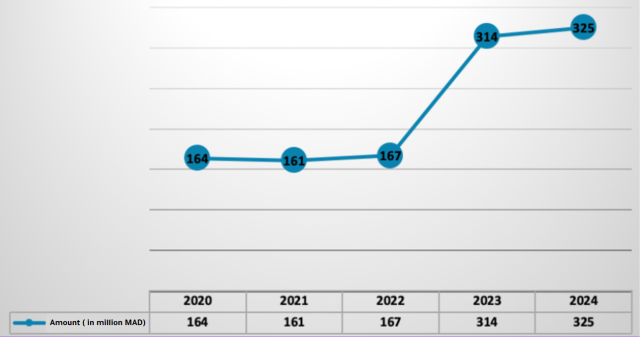
Chart 1 shows that government subsidies for the press and publishing sector have risen steadily over the past four years. The amount reached 164 million dirhams in 2020, before declining slightly in 2021 to 161 million dirhams. It then resumed its upward trajectory in 2022, jumping to 167 million dirhams, and continued this trend by reaching 314 million dirhams in 2023. In 2024, it recorded its most significant increase to date, reaching 325 million dirhams. This rise can be attributed to the steady growth in the number of subsidy beneficiaries (see Table 3 below), while also reflecting the current government’s priorities for this sector7[7] The current government (2021–2026) was installed on Thursday, 29 Ṣafar 1443 AH, corresponding to 7 October 2021.. Moreover, some argue that state support for the press is an essential component of journalism economics, as it allows press companies, which are unable by their own means to achieve their financial stability or continue publishing, to ensure the continuation of their activities 8Abdelmajid Fadil, Economics of the Written Press, op. cit., p. 91..
The number of beneficiaries of this support has also grown steadily, as has the number of companies that applied for the subsidy, particularly the flat-rate subsidy allocated to press companies based on their wage bill. This is understood in the context that “support based on the wage bill was granted to companies that submitted their application files before May 22, 2020, are registered with the National Social Security Fund, and have obtained the necessary compliance and a sound tax status.”9See the response of Minister of Youth, Culture, and Communication Mohamed El Mahdi Bensaid on 17 March 2022 to a written question from MP Naïma El Fathawi, op. cit.
Chart 2: Trends in the number of beneficiaries of public subsidies for the press and publishing sector
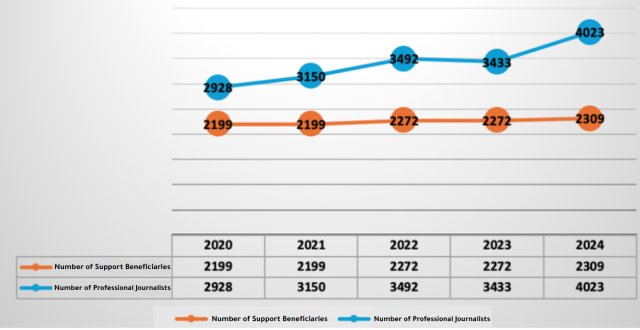
Chart 2 illustrates the evolution of the number of beneficiaries of public support for the sector over the last four years. In both 2021 and 2022, there were 2199 beneficiaries. This figure rose to 2272 beneficiaries in 2023 and reached2309 in 2024, which is explained by the demand for subsidies or the rise in holders of the professional press card10Based on statistics for female and male journalists for the years 2022–2024 as published on the National Press Council’s website: https://tinyurl.com/wverb5kd issued by the National Press Council, as shown in Chart 2. While some consider the record number of subsidies “a reflection of the state’s efforts on behalf of the press,”11Abdelmajid Fadil, Economics of the Written Press, op. cit., p. 113. others warn that the purpose of sustaining this situation is to “domesticate the private media.”12Moroccan Association for Supporting Political Prisoners – HIMAM, statement on the occasion of World Press Freedom Day, 3 May 2025; see also “The Opposition Denounces the Transformation of Public Media into an Electoral Tool in the Hands of Majority Parties and Accuses the Government of ‘Soft Suppression’ of Press Freedom,” Assahifa website, accessed 20 May 2025, https://tinyurl.com/sxysfa7n; and “Monitoring Morocco,” Reporters Without Borders, accessed 20 May 2025, https://tinyurl.com/ycyj7rw6
Chart 3: Trends in the number of companies receiving wage subsidies and flat-rate subsidies
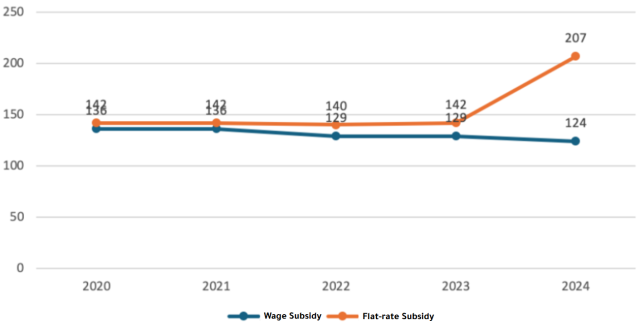
Chart (3) reveals a relative stability in the number of press companies receiving wage subsidies, which declined gradually from 136 in 2020 to 124 in 2024, while the number of companies receiving flat-rate subsidies rose continuously from 142 in 2020 to 207 in 2024.This is because the flat-rate subsidy “benefited companies that applied for it after the deadline (i.e., after May 22, 2022), and meet the compliance requirement,hold a certificate of declaration with the National Social Security Fund, andpossess a certificate of sound tax status.”13See the response of Minister Mohamed El Mahdi Bensaid on 17 March 2022 to MP Naïma El Fathawi’s written question, op. cit.
Absence of transparency and detailed lists
The principle of transparency represents the most significant issue in the approach to public subsidies to the press and publishing sector. The current government has not published the lists of companies benefiting from public subsidies14The National Human Rights Council notes in its Annual Report on the State of Human Rights in Morocco for 2023, entitled “Establishing the Foundations of a National System for Protecting Economic and Social Rights,” that “unlike in 2022, the concerned ministry did not announce the total amount of support for 2023” (n. 72)., contrary to the practice maintained by previous governments15See, for example, the list of direct public subsidies granted to the written press, 2005–2011, at https://tinyurl.com/3aw934j4, so that citizens can access them, in fulfillment of the constitutional right to information stipulated in Article 27 of the Kingdom’s constitution.
The annual report issued by the Ministry of Communication (formerly) on the “efforts to promote press freedom”16The last annual report on “Promoting Press Freedom” by the Ministry of Communication was published in 2016; despite its discontinuation, the ministry continued to release lists of beneficiary enterprises. was among the most important reports that included a list of companies benefiting from public subsidies, a list of companies benefiting from administrative advertisements granted to newspapers, the number of holders of professional press cards, and other key details.
Concurrently, the Ministry of Communication also published a report on “the statistics of journalists’ professional cards,” which listed the names of journalists, their ranking number, and their employing institutions.17The Ministry of Communication used to publish a detailed report containing lists of media organizations, names of their affiliated journalists, and their serial numbers; the National Press Council abandoned this best practice. See, for example, the Ministry’s 2015 report on “Statistics of Journalists’ Professional Cards.” Following the transfer of responsibilities, the National Press Council abandoned this practice, while “publishing the list of journalists holding a professional press card remained a demand by professionals. In 2021, the Council merely announced it was in talks and consultations with officials from the Personal Data Protection Committee to publish the lists of journalists holding the professional press card for the years 2020 and 2021 to ensure the conditions of integrity and transparency, without disclosing the outcome of those consultations or publishing the full lists of journalists.”18Mohamed Karim Boukhsas, “Has the Self-Regulation of the Press Reached a Dead End?”, Moroccan Institute for Policy Analysis, 24 April 2023, p. 16. This pattern of recurring incidents, therefore, offers compelling evidence of an emergent trend towards the suppression of information.
Figure 1: Sample detailed list of the public subsidy amounts granted to print newspapers (2011 – 2012)
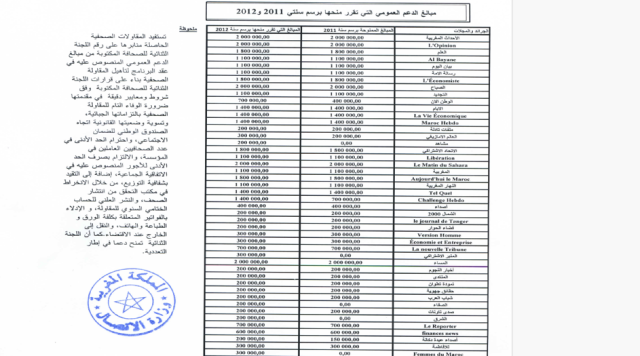
Imbalance in distribution criteria
One of the main issues raised by the distribution of public financial support, as it relates to transparency, is the fairness of the distribution criteria. The Moroccan Federation of Newspaper Publishers has argued that “this support was neither fair nor equitable, with some newspaper companies doubling their support 20 times to reach millions of dirhams, while others did not reach 30,000 dirhams.”19 “Public Subsidies to Press Enterprises Exceeded 50 billion centimes over 3 years” Lakome2, accessed 12 April 2025, https://lakome2.com/media/299113/
The nature of this imbalance is more clearly discerned when considering Abdelmajid Fadel’s examination of various /experiences and their specific applicability to the Moroccan context. As he states: “The newspapers enjoy subsidies that they don’t need. These subsidies mainly benefit large groups owned by wealthy businessmen or the regional press.”20Abdelmajid Fadil, op. cit., p. 99. Several examples have been cited of holding companies that include journalism as part of their business.
Moreover, it is important to recognize the diversity of the journalism field. The electronic platform of a newspaper exempts it from the costs of printing, distribution, internal and external transportation, and some estimate the percentage of exemption from costs if the platform is paper-based to be around 50 to 60 percent21Abdelmajid Fadil, op. cit., p. 121.. Consequently, subsidy measures must account for these variables.
Inconsistency in the official statements
Referring to the statements of the Minister of Youth, Culture and Communication, Mohamed El Mahdi Bensaid, on public subsidies reveals a hesitancy to establish a timeline for ending this form of subsidy and transitioning to a new model of supporting journalistic companies instead of paying their salaries22A new framework for public support to the press, publishing, printing, and distribution sectors was established by the following regulatory instruments: • Decree No. 2.23.1041 of 8 Jumādā al-Ākhirah 1445 AH (22 December 2023), determining the conditions and modalities for benefiting from public support directed to the press, publishing, printing, and distribution sectors; • Joint Order No. 2345.24 of the Minister of Youth, Culture, and Communication and the Delegate Minister to the Minister of Economy and Finance in charge of the Budget, dated 2 Jumādā al-Ūlā 1446 AH (5 November 2024), setting the ceilings for operating support and investment support for the press, publishing, printing, and distribution sectors, their calculation rates, and the modalities for their allocation and disbursement; • Joint Order No. 677.25 of the Minister of Youth, Culture, and Communication and the Delegate Minister to the Minister of Economy and Finance in charge of the Budget, dated 23 Ramaḍān 1446 AH (24 March 2025), amending Joint Order No. 2345.24 of 2 Jumādā al-Ūlā 1446 AH (5 November 2024) concerning the ceilings, calculation, allocation, and disbursement modalities for operating and investment support to the press, publishing, printing, and distribution sectors; • Order No. 3195.24 of the Minister of Youth, Culture, and Communication, dated 17 Jumādā al-Ākhirah 1446 AH (19 December 2024), defining the documents comprising the application file for public support to the press, publishing, printing, and distribution sectors.. For example, on November 4, 2022, during the meeting of the Education, Culture and Communication Committee of the House of Representatives, which was dedicated to presenting the draft sub-budgets for the youth, culture and communication sector, he stated the following: “[Regarding the press, the government has continued the achievements of the previous government, maintained the support decided during COVID-19, and paid the salaries of journalists for six months during this year, which will be the last.”23House of Representatives, Report on the Sub-Budget for the Youth, Culture, and Communication Sector for 2023, p. 279. Yet, on multiple occasions, including his statements on January 7, 2025 at the meeting of the Education, Culture and Communication Committee of the House of Representatives, he affirmed that the exceptional government support for the press and publishing sector will end in March 2025. Nevertheless, journalists’ inquiries indicate that the subsidies are still being disbursed. Indeed, on 6 May 2025, the Ministry of Youth, Culture, and Communication announced the launch of the application period for public subsidies to the press, publishing, printing, and distribution sectors, open from 14 May to 26 June 2025.24Ministry of Youth, Culture, and Communication, “Launch of the Application Process for Public Support Allocated to the Press, Publishing, Printing, and Distribution Sectors,” accessed 18 May 2025, Ministry website, https://tinyurl.com/593fnzjp
Decline in Accountability and Absence of Effectiveness
As is widely recognized within international accounting literature, the engagement of public funds inherently necessitates rigorous accountability,25This principle is rendered in the Moroccan Constitution as “linking responsibility with accountability.” which is typically multifaceted and formally entrusted to financialauditing institutions. In Morocco, institutions such as the Court of Accounts and the General Inspectorate of Finance are mandated to perform this role, whether administrative or judicial.
In this regard, the most recent evaluation of public support for the press is found in the annual report of the Court of Accounts for the fiscal years 2016 and 2017, titled: “Evaluation of Support for the Written Press.” This indicates that the report examines a period several years in the past, and its scope is limited to monitoring the support provided to the print press 26Court of Accounts, Annual Report of the Court of Accounts 2016–2017, Court Publications, pp. 570–583..
Furthermore, the disbursement of public subsidies in any sector necessitates consideration of both feasibility and effectiveness. While this support may have achieved the objective of paying journalists’ salaries and social benefits, it has, conversely, raised questions regarding the justification for disbursing salaries to the owners of private press companies.
A report by the National Press Council has also highlighted the issue of effectiveness, noting that “the outcome of this exceptional support is the stark disparities produced by the newly established criterion of employee salaries, (…) multiplying it more than tenfold for the benefit of a small number of large companies, while medium and small press organizations have not even received the amount of support they were receiving under the regular subsidy framework” 27National Press Council, Report 2: The Moroccan Press and the Effects of the Pandemic after the Lockdown, July 2020–May 2021, Council Publications, p. 27..
Infringement Upon Independence
The Minister of Youth, Culture, and Communication defends this support by pointing to its existence in countries worldwide, including democracies. This provision is not disputed and is based on Article 7 of Law No. 88.13 concerning the Press and Publishing, which states in its second paragraph that:
“The press, publishing, printing and distribution sectors benefit from public support based on the principles of transparency, equal opportunities, and impartiality, with the aim of developing readership, promoting pluralism, and supporting their human resources” 28Law No. 88.13 relating to press and publishing, Official Gazette No. 6491 – 11 Dhū al-Qeʿdah 1437 AH (15 August 2016), p. 5968..
The issue has evolved from supporting private press companies to assist them in building a sustainable economic model to directly disbursing the salaries of workers in the sector and their social security contributions to the National Social Security Fund, akin to state employees in public media. This shift raises concerns regarding independence, particularly regardingthe correlation between this support and the transformation of electronic and print newspapers into platforms for advocating government policies.29We find a similar stance in the remarks of Touria Afife, MP of the Justice and Development Group, who stated on behalf of her group during the Education, Culture, and Communication Committee meeting on Tuesday, 7 January 2025: “Mentioning the outcome of public support today ‘refers us back to the democratic regression that undermined the gain of independence and self-regulation of the press and publishing sector under the name of the “Interim Committee for Managing the Affairs of the Press and Publishing,” which is one manifestation of the policy of control and domination pursued by this government. Its two-year mandate is about to end—so what preparations have you made for electing the members of the National Press Council?’” See: ʿAfife: “The Government Controls the Media Scene through Public Support,” Justice and Development Group website, accessed 14 April 2025, https://www.pjdgroupe.ma/fr/node/2549.
In this context, Noureddine Meftah, president of the Moroccan Federation of Newspaper Publishers, stated: “I believe that ‘exceptional support’ was meant to be exceptional in the truest sense, and it cannot be reinstated in this form because it contravenes the law, especially Article 7 of the Press Law and its implementing decree. If the subsidy is to be paid directly to press employees, then the law itself must be amended. Here, the question arises: Whatdo journalists gain by having their salaries come from the government? Beyond being fundamentally flawed and compromising press independence in principle, it is the responsibility of private enterprises to pay their employees and to manage their performance and incentives.”30Saïd Raihani, “Interview of the Issue with Noureddine Miftah, President of the Moroccan Federation of Newspaper Publishers: ‘Exceptional Support for the Press Was Unfair and Morocco Needs a National Front,’” Alousboueʿ newspaper website, https://www.alousboue.ma/79537/.
Conversely, the National Human Rights Council proposes: “Increasing both direct and indirect public support allocated to the press sector to ensure the expansion of publication, promote pluralism and diversity, and support the modernization, rehabilitation, and sustainability of press companies” 31National Human Rights Council, Annual Report on the State of Human Rights in Morocco for the Year 2022, entitled “Reordering Priorities to Enhance the Realization of Rights,” p. 81.. It further insists that “the distribution of public support must be conducted in a manner that ensures the expansion of publication, promotes pluralism and diversity, supports the modernization of press companies, and ensures their sustainability” 32National Human Rights Council, Annual Report on the State of Human Rights in Morocco for the Year 2023, op. cit., p. 73..
Alternative Approaches
Given the above, it is essential to adopt the principles of transparency, accountability, and effectiveness in order to foster a democratic environment in which press companies enjoy independence and journalists work with dignity, especially following the implementation of the decision to set ceilings for operating and investment subsidies for the press, publishing, printing, and distribution sectors33Joint Order No. 2345.24 of the Minister of Youth, Culture, and Communication and the Delegate Minister to the Minister of Economy and Finance in charge of the Budget, dated 2 Jumādā al-Ūlā 1446 AH (5 November 2024), determining the ceilings for operating support and investment support for the press, publishing, printing, and distribution sectors, and the modalities for their allocation and disbursement, Official Gazette No. 7353 – 15 Jumādā al-Ūlā 1446 AH (18 November 2024), p. 7890. . This responsibility falls on several parties, including the Ministry of Youth, Culture, and Communication, which must publish the details of the financial amounts of public support transparently for each media outlet 34atement of the “Victims of the Interim Committee for Managing Press Affairs” Coordination, January 2025. and disseminatingthe list of newspapers benefiting from administrative advertising, the number of advertisements granted to each company, and the number of accredited journalists.
The Court of Accounts 35Article 147(2) of the 2011 Constitution provides that “the Court of Accounts shall exercise the task of reinforcing and protecting the principles and values of good governance, transparency, and accountability for the State and public bodies.” is also responsible for conducting financial and accounting audits to ascertain the avenues of expenditure for public financial support. The National Press Council must also publish a list of journalists holding press cards and their employing institutions, and the Public Prosecution Service must publish a list of registered electronic newspapers and print publications, as well as legal proceedings related to journalists, while recalling the responsibility of Members of Parliament in holding this sector accountable. All these measures are likely to bring about a qualitative leap in the indicators of the press, media, and the right to information.
Abdellah Amouche
Moroccan Journalist and researcher, currently majoring in "Print and Online Newspapers" at Ibn Tofail University. He has published several studies in several research centers, including a field study entitled « Partisan press in Morocco striving to win the public... Will the digital edition succeed? » He also published opinion articles and translations on many Arab and Moroccan media platforms. He contributed to intellectual and media events, as well as interviews. Also, he is studying at the American Language Center in Rabat, and at the World English Institute in the United States, and he holds a certificate of training in investigative journalism from the Thomson Reuters Foundation

